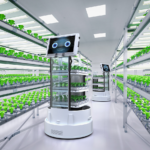
EU Adopts Gene Techniques in Food Production
- foodfightadmin
- July 7, 2023
- Federal, NEW
- adlps, ads pages
- 0 Comments
BRUSSELS (AP) —In a significant shift, the European Union is moving towards embracing contemporary gene-editing techniques in its food production system. This change is seen as a crucial step to address global challenges like climate change and food shortages. Historically, the EU has been cautious about the use of genetically modified organisms (GMOs), often perceived negatively as ‘Frankenfood’, while countries like the United States rapidly adopted bioengineered technologies.
The EU’s executive commission announced its support for new genomic techniques on Wednesday. These techniques are considered less intrusive than traditional GMOs and do not require special labeling for many products. “In many ways, new genomic techniques can give you the same results as through conventional and natural selection, or through targeted crossbreeding, but with much more speed, precision, and efficiency,” explained European Commission Vice President Frans Timmermans.
These innovative methods aim to enhance plant drought resistance, reduce pesticide use, and produce more visually appealing and consistent products for consumers. The announcement has been met with mixed reactions: farming companies have welcomed it, while environmentalists have expressed strong opposition, citing safety concerns.
This proposal marks the beginning of a lengthy legislative process, requiring the endorsement of member nations and the European Parliament. The EU’s current GMO legislation, dating back to 2001, was established after prolonged division over the issue. It was designed to prevent the unregulated production and sale of GMOs by multinational agro-corporations without comprehensive labeling and warnings.
Copa-Cogeca, the EU’s main farm lobby, praised the commission’s move, while environmentalists, like Eva Corral of Greenpeace, called for stringent safety testing. “Whether it’s a toy or a face cream, any product on the market needs to be safety tested. Why would there be an exemption for GMOs that end up in our fields or on our plates,” Corral stated.
However, Timmermans assures that the proposal emphasizes caution. Plants based on new genomic techniques that could naturally occur or be achieved through conventional breeding will be treated like conventional plants. Others would still be subjected to strict GMO regulations.
The European People’s Party, the largest group in the EU legislature, has expressed support for the plans. European Parliament member Jessica Polfjärd believes that if implemented correctly, the proposal will enhance European competitiveness, reduce emissions, and increase global food availability. “Everybody should be able to support those objectives,” she stated.








